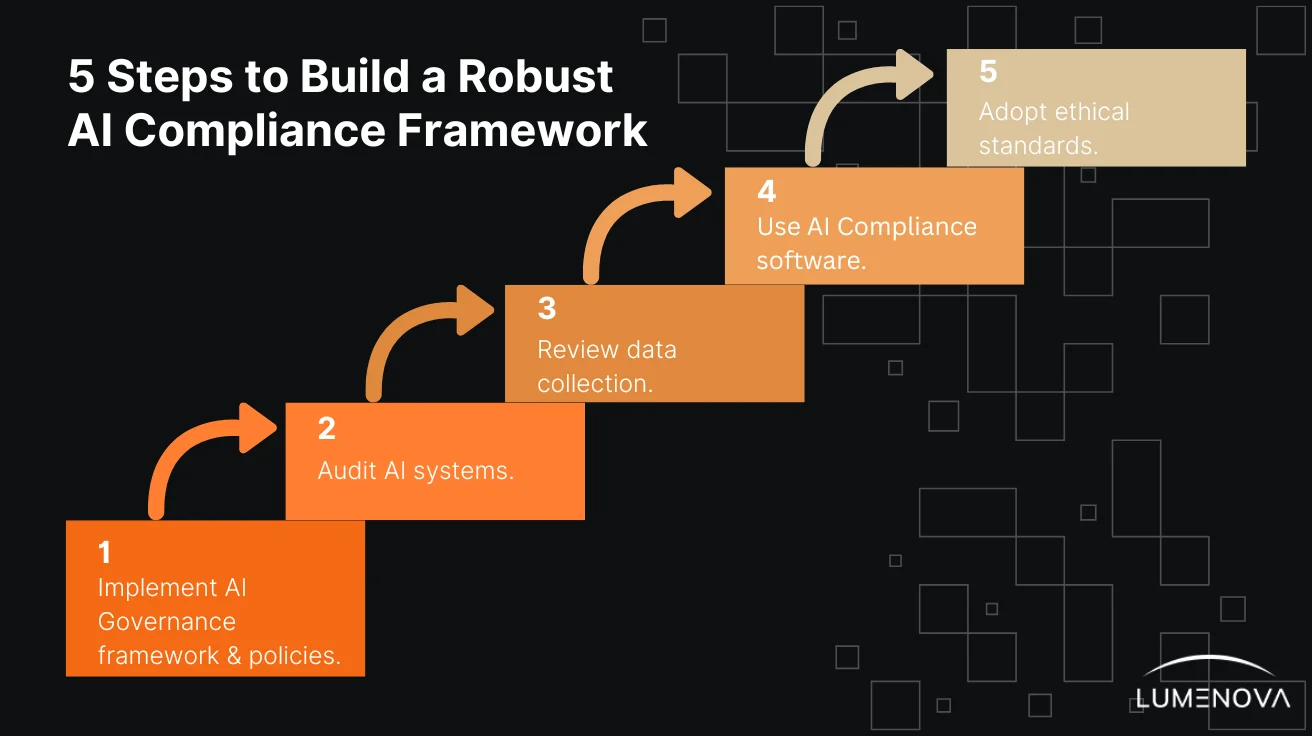AI Compliance
In an era where artificial intelligence (AI) is reshaping industries, ensuring its responsible use has become a top priority. AI compliance is the practice of making sure AI systems meet legal, regulatory, and ethical standards. It safeguards businesses from potential risks, fosters accountability and safe innovation, and ensures AI technologies operate transparently and ethically.
What Is AI Compliance?
At its core, AI compliance ensures that AI systems align with applicable laws, industry regulations, and internal organizational policies. It’s about more than just meeting legal obligations; it’s a commitment to fairness, transparency, and accountability in how AI is developed and deployed.
For example, regulatory compliance AI helps organizations comply with global frameworks like GDPR, the EU AI Act, or industry-specific guidelines while addressing critical issues such as data privacy, bias, and ethical concerns.
Why Does AI Compliance Matter?
The rapid adoption of AI has introduced new challenges, including potential misuse, algorithmic bias, and data privacy risks. AI and compliance go hand in hand to address these issues by:
- Mitigating Risks: Ensuring that AI systems do not produce harmful or discriminatory outputs.
- Protecting Privacy: Safeguarding personal, proprietary, or senstivedata and adhering to strict data protection laws.
- Building Trust: Demonstrating transparency and ethical practices to stakeholders.
- Ensuring Innovation Within Bounds: Balancing technological advancement with compliance to maintain public trust and safety.
Key Applications of AI in Compliance
AI for Regulatory Compliance
Organizations use AI-based compliance solutions to automate various tasks (such as reviewing legal documents, tracking transactions, and assessing risk), analyze data, and ensure adherence to regulations. Examples include monitoring financial transactions for fraud and meeting GDPR requirements.
Compliant AI in Business Operations
Compliant AI systems are designed with legal and ethical standards at their core, supporting alignment with regulatory frameworks from the start. Unlike non-compliant systems, they proactively integrate safeguards to meet evolving laws, promote transparency, and reduce legal risks.
AI Compliance Software
Specialized tools like AI compliance software help organizations monitor, audit, and manage their AI systems to meet regulatory requirements. These tools improve efficiency and reduce human error in compliance workflows.
Benefits of AI Compliance
- Risk Reduction: Identifying and addressing potential risks in AI systems before they escalate.
- Enhanced Transparency: Clear documentation of how AI systems make decisions, fostering accountability.
- Regulatory Alignment: Staying compliant with evolving laws and regulations using AI for regulatory compliance.
- Improved Efficiency: Leveraging AI compliance software to streamline compliance tasks and reduce costs.
Challenges of AI Compliance
While AI in compliance offers many benefits, there are challenges to consider, such as:
- Maintaining transparency and explainability in complex AI systems.
- Keeping up with constantly evolving regulations.
- Addressing biases in AI models to meet fairness requirements.
Building a Compliance Framework
To implement AI compliance, organizations should:

- Implement an AI Governance Framework and Policies: First and foremost, establish a robust AI governance framework. This means creating clear, actionable policies that define how AI is developed, deployed, and monitored, ensuring full compliance with relevant regulations and best practices.
- Audit AI Systems: Make auditing AI systems a consistent and standardized practice. This helps your models remain fair, accurate, and transparent, preventing bias and aligning with ethical standards. It’s not just about monitoring; it’s about understanding how your AI systems evolve over time.
- Monitor Data Governance: Regularly review how your data is collected, stored, and used, ensuring it complies with privacy laws like GDPR. For example, anonymizing sensitive data in AI systems helps maintain customer trust and avoid legal issues.
- Use AI Compliance Software: Automate compliance processes with tools like TrustArc, which help track AI model performance and maintain audit trails. This ensures your AI systems remain compliant with evolving regulations without manual effort.
- Adopt Ethical Standards: Integrate ethical principles into AI design, development, and deployment by prioritizing fairness, transparency, and accountability. For example, conducting regular audits to identify and mitigate bias in AI algorithms fosters trust and ensures that the technology serves all users equitably.